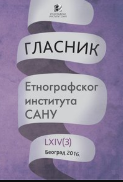Временско одрећење празника и годишњих обичаја у Подавалским селима
Temporal Settling of Holidays and Annual Customs in Villages at the Foot of the Ayala Mountain
Author(s): Milina Ivanović-BarišićSubject(s): Customs / Folklore, Cultural Anthropology / Ethnology, Post-War period (1950 - 1989), Transformation Period (1990 - 2010)
Published by: Етнографски институт САНУ
Keywords: holiday; holiday-tide; season and annual customs; villages at the foot of the Avala mountain period from the end of World War II until 1960’s of the last century;
Summary/Abstract: The life of rural population in villages at the foot of the Avala Mountain was marked by a constant shift of working days — when the local population had to ensure its existence — and idle days. Various holiday occasions altered the regularities of everyday life. During a holiday celebration the whole village community, as well as individuals, had to adopt a new way of behavior — i.e., to discontinue all work obligations that filled regular, working days. In the past, these idle days were equally important for families and their members, and for the rural community in general. On the whole, the holidays appear in an annual cycle, discernible in a parallel mode: 1, Weekly and 2, Annual celebrations. The Weekly cycle is celebrated on Sundays, while the annual cycle celebrated various family’ holidays or just days marked as “holidays”. During the celebration of holidays, participants departed from their everyday existing conditions and attuned to the Holy time, generated during holidays. Various rituals and customs used to be performed that not only added to the holiday ambiance, but also ensured the well-being of the family and rural community, and protected in this way, against misfortune. This period was marked by profound changes in family and community organizations. The changes in rural areas are the result of the rural population mass relocation in search for work and the beginning of urbanization. The process of industrialization along with the influx of the authorities onto traditional folk culture have left permanent consequences in the rural community settings and inherited folk culture.
Journal: Гласник Етнографског института САНУ
- Issue Year: LII/2004
- Issue No: 1
- Page Range: 257-266
- Page Count: 10
- Language: Serbian

